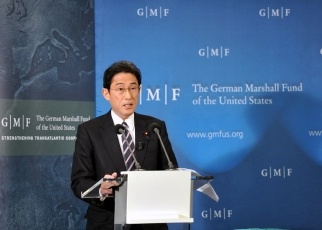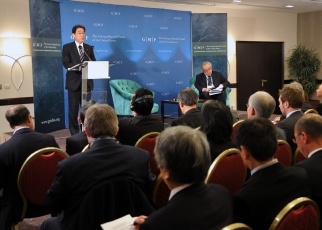Europe
Foreign Minister Fumio Kishida’s Keynote Address at an International Symposium Hosted by the GMF
January 21, 2015


On January 20, commencing at 9:30 a.m. for one hour (local time), Mr. Fumio Kishida, Minister for Foreign Affairs, who was visiting Brussels, delivered a keynote address in the Japan Trilateral Forum, Brussels (closed to the public), an international symposium that was hosted by the German Marshall Fund (GMF) of the United States on January 19 and 20. The overview is as follows. Approximately 130 people attended the keynote address, including government officials from the EU, NATO and the U.S., renowned experts and media from the U.S. and Europe.
1. Keynote address by Minister Kishida
Minister Kishida gave a keynote address on the topic of "Year 2015 as the opening of a new chapter in Japan-Europe relations." The main points are as follows.
Full text (original text in English (PDF) / Japanese translation (PDF)
/ Japanese translation (PDF) )
)
Main points of the address
- Minister Kishida explained with specific examples that for 70 years since the war, Japan has acted with Europe to uphold and strengthen values and the systems that realize these values, and has contributed to world peace and prosperity.
- He emphasized that based on the "trust" and track record generated in that process, the Abe Administration has significantly advanced the relationship between Japan and Europe, as powerful partners in "diplomacy that takes a panoramic perspective of the world map."
- Minister Kishida said that with "the 70th year from the end of World War II" and "the year 2015" as key phrases, he wants to advance three pillars -- (1) Peace and stability; (2) Global challenges; and (3) Regional and global economies -- in order to reinforce the relationship between Japan and Europe.
- In particular, while discussing (1) Peace and stability, Minister Kishida mentioned Japan's future efforts in connection with fighting international terrorism, including new assistance of 7.5 million U.S. dollars to build counter-terrorism capacity in Africa and the Middle East, and stronger coordination between Japan and Europe, along with announcing fresh assistance of approximately 16.6 million U.S. dollars for the recovery of eastern Ukraine and at least 300 million U.S. dollars to help Ukraine stabilize its economy.
2. Comments from EU and NATO, and a question-and-answer session with participants
Following this, there were comments from NATO and the EU on Minister Kishida's keynote address, and Minister Kishida held a question-and-answer session with participants.
- NATO Deputy Secretary General Alexander Vershbow commented that: (1) He appreciates that Japan has continued to be an exporter of global peace and stability over the last several decades, including international cooperation activities by the Japan Self-Defense Forces and contributions to Afghanistan; (2) He appreciates that the Abe Administration's "Proactive Contribution to Peace" policy is also a response to the needs of a world where mutual dependence on the security front, from terrorism to infectious diseases, is growing, and will contribute to global peace and stability; (3) Japan, the U.S. and Europe are coordinating their responses to the Ukraine situation and the East Asia situation, and the three pillars presented by Minister Kishida will make it possible to promote cooperation with a more comprehensive approach; and (4) Japan and NATO, which share values and interests and whose responsibilities are mutually complementary, should contribute more to key regional and global challenges by enhancing interoperability and promoting political dialogue.
- Mr. Ugo Astuto, Acting Managing Director, Asia & the Pacific, European External Action Service, commented that: (1) The two regions and the world are facing major challenges in relation to peace and stability, and the EU welcomes that Japan is seeking to fulfill more major responsibilities in the interests of regional and global peace and stability; (2) In addition to strengthening current Japan-EU security cooperation, he also hopes Japan will participate in the EU's crisis management missions; and (3) By realizing a high-level and comprehensive Japan-EU Economic Partnership Agreement (EPA) Japan and the EU can both continue to exercise leadership in the formation of international trade standards, and by concluding the Strategic Partnership Agreement (SPA) it will be possible to send the powerful political signal that Japan and Europe are both contributing.
- Lastly, Minister Kishida held a question-and-answer session with participants regarding: (1) The relationship between Japan's response to the Ukraine situation and the Northern Territoriesissue; (2) Conceivable support from Europe and the U.S. for Japan-Republic of Korea relations, which are celebrating the 50th anniversary of the normalization of diplomatic relations; and (3) Japan's future responses and the possibility of Japan-German cooperation in connection with that, in the 70th year from the war.

